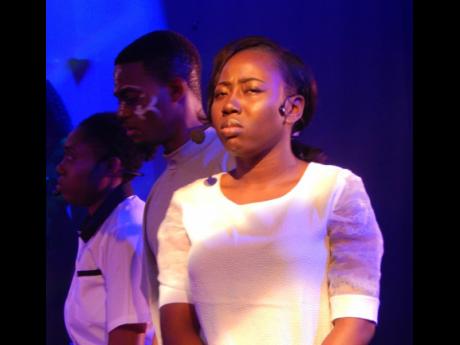‘Seville and di Bone Tribunal’ an edutaining musical
S eville and di Bone Tribunal, a musical now playing at the Philip Sherlock Centre for the Performing Arts (PSCPA), is the third in a series of writer-director Michael Holgate’s Caribbean Mythery plays. His earlier ones were Riot Act and Garvey The Musical.
Holgate explained in an email to me, that through the process of ‘mythery’, he was trying to develop “an indigenous and empowering musical-theatre style based in myth-making and research. It brings together characters who are folk heroes, historical figures, and mythical characters alongside fictional-realistic characters in a liminal space”.
About the current production, which closes on Sunday, May 26, he writes in the programme’s director’s notes: “I am a teacher, an advocate and an artist,” adding later, “I am observing my own process and I am listening a lot.”
Among those he might have wanted to listen to were some experienced theatre practitioners in last Sunday afternoon’s audience who had some dissatisfaction with the production. Like me, they were concerned that the teacher and advocate in Holgate had overwhelmed the artist (as playwright, though not as other things).
We agreed that the production was more of a dramatised history-civics class than a play. It is unusually heavy on message and the imparting of information. The general message is that we Jamaicans (and, by extension, humans) should know, respect and love ourselves and one another. The information comprises mainly historical/archaeological facts and theories.
Holgate as teacher and advocate is manifest in two main streams of intermittent onstage action. On the apron to the audience’s left (technically stage right), a guide to Seville Great House, Emcee Bip (Monét Flowers), and her initially unwelcome partner, Emcee Bap (Fitsroy Randall), dole out facts about the place to visitors.
Meanwhile, on the main stage, a group of university students and their lecturer, Prof Lehrman (Jean-Paul Menou); a thief, Skeng (Melbourne Douglas); and a security guard, Johnson (Shanice McCatty), have a complicated encounter in the smoke-filled great house graveyard with ancestral spirits.
The living and the not-quite-dead meet because the former have lessons to learn from the latter. Only if the lessons are learnt – and this is symbolised by the visitors finding three bones – will the visitors be allowed to leave the graveyard.
MORAL TALES
Now audiences will quickly recognise that this situation is common to fairy and duppy stories. Many of them are simply morality tales, and their purpose is to leach moral lessons. It might even be argued that the most highly regarded writing is the kind that we learn something from, not the kind that we merely find entertaining. So we learn a lot from Shakespeare, from Soyinka, and, to come to Caribbean playwrights, from Walcott, Scott and Rhone.
But saying we can learn from a play is not the same as saying the playwright set out to teach us something. None of the playwrights just named would say of their plays, as Holgate does of his mythery plays, “Yes, this is a form of didactic theatre, and I hope it is both entertaining and empowering.”
HOLGATE’S EDGE
Fortunately for Holgate, his plays are, indeed, both entertaining and empowering, and it is partly because he has an edge over the playwrights named — and, in fact, most others. He has more artistic skills to use for his theatrical productions than they do.
As close to being a total theatre practitioner as they come, he is playwright, director, actor, dancer, set designer, choreographer, lyricist and composer. He is also a producer and probably sings and plays a musical instrument, and he uses most, though not all, of these skills in Seville.
The performers are an eclectic mix of drummers, dancers, members of the talented University Players, special guests who regularly perform outside the university – like Menou, Phillip Earle (Bone Teller), Nadean Rawlins (Bone Queen) and Hilary Nicholson (Bone Regulator) – and the 10-year-old choir, The Jamaica Youth Chorale (JYC). The JYC’s founder and leader, Gregory Simms, is Seville’s musical director.
Not surprisingly, it is a very edutaining show.

